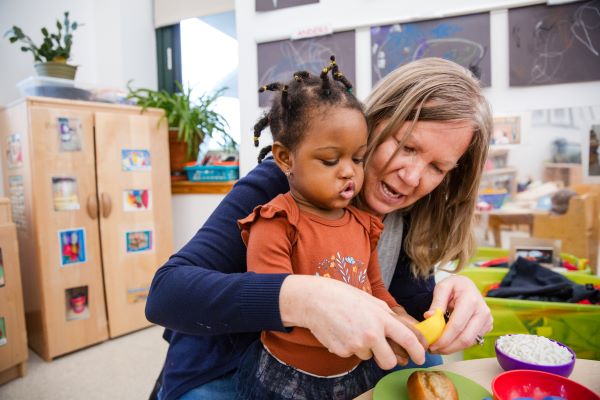If you work in early childhood, chances are you have heard the term “word gap.” The term was first established in the 1995 Hart/Risley study, which discovered that low-income children are exposed to 30 million fewer words than their high-income peers before the age of three. The Hart/Risley study and others have found a connection between poor early literacy skills and lifetime educational, societal and income inequalities. Word gap initiatives predominantly focus on targeting low-income parents to assist them with understanding the effect they have on their children’s intellectual growth.
A recent article in the Washington Post argues that the “word gap” phenomenon plays out with early childhood educators too. Although parents and caregivers serve as a child’s first teacher, early childhood educators play a significant role in the growth and development of a child’s early literacy skills. There are several million children today that spend a great amount of time in early education settings. This study has shown that low-income children can spend more hours a week in child care than with their parents.
The Washington Post article states that as many as one million state-licensed and nationally-credentialed early childhood educators are at-risk for functional illiteracy across the country. This means that their reading and writing skills are insufficient to handle the daily living and employment duties that necessitate reading skills beyond the basic level that they know. If true, this would likely surprise many Americans.
The article argues that we are missing an important step to achieving our goal to close the word gap. In order for us to close the word gap for low-income children, we must first focus on closing the gap for functionally illiterate early childhood educators. This means that we must increase and, perhaps, update professional development approaches to ensure we utilize adult literacy testing that measures and improves low-literacy in early childhood educators. This important step will help close the achievement and opportunity gaps for educators and the children in their care.
We want to hear your thoughts. Have you experienced the word gap with your colleagues or, if you are a caregiver, with your early education teachers? Early childhood educators have one of the most difficult jobs and need support. How can we better support our educators?
Click here to be redirected to The Washington Post to fully read “The Famous “Word Gap” Doesn’t Hurt Only the Young. It Affects Many Educators, Too” article.

